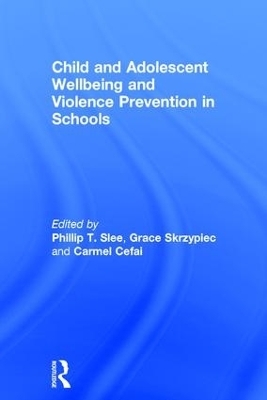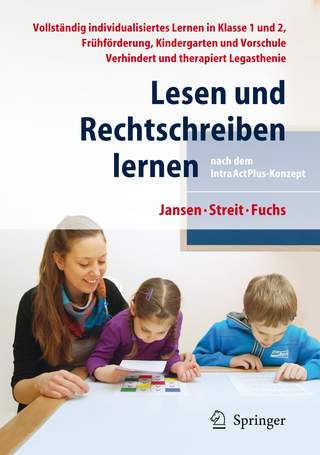
Child and Adolescent Wellbeing and Violence Prevention in Schools
Routledge (Verlag)
978-1-138-10475-4 (ISBN)
This invaluable book offers a comprehensive guide for educators in understanding and promoting wellbeing and violence prevention initiatives in schools and communities. Ittranslates research and theory into practice with a strong evidence-based application.
The book is presented in five thematic sections, namely: culture and wellbeing; young females and wellbeing; bullying; cyberbullying and student violence; interventions to promote wellbeing; and interventions to promote violence prevention. An introductory chapter provides an overview of the field and a commentary chapter draws the five themes together.
Written by experienced researchers and educators, each of the 21 chapters provides practical information and research on school, classroom or community applications, trends and issues in the field, and practical ideas for wellbeing and violence prevention measures. Issues of culture, gender and youth voice are specifically addressed.
Phillip T. Slee is Professor of Human Development in the School of Education at Flinders University, Adelaide. He is a trained teacher and registered psychologist with research interests in child and adolescent mental health, and childhood bullying/aggression — especially their practical and policy implications. He has published over 100 refereed papers, 25 book chapters and 15 books including Child Development Theories and critical Perspectives. Grace Skrzypiec is a psychologist, experienced teacher and the recipient of the 2014 Vice-Chancellor’s Award for Early Career Researchers in recognition of outstanding contributions to excellence in research. Her research focuses on wellbeing in relation to peer aggression, bullying and other antisocial behaviour. She is particularly interested in working with researchers in other countries to reduce the incidence of peer-aggression. Carmel Cefai is the Director of the Centre for Resilience and Socio-Emotional Health at the University of Malta. He is Joint Honorary Chair of the European Network for Social and Emotional Competence and joint founding editor of the International Journal of Emotional Education. His research interests are focused on how to create healthy spaces which promote the resilience, wellbeing and psychological wellbeing of children and young people, particularly those at risk.
Dedication
Acknowledgements
List of contributors
List of figures
List of tables
Preface Marie-Louise Coleira Preca, the President of Malta
Chapter 1. Challenges in promoting wellbeing and addressing violence through schools Shelley Hymel, Lindsay Starosta, Randip Gill and Angela Low
Section 1: Culture and Wellbeing
Chapter 2. Country and wellbeing: Ngarrindjeri speaking as country Steve Hemming and Daryle Rigney
Chapter 3. Indigenous Australian youth, identity, Rap/Hip Hop: A tool for wellbeing and ethical care Faye Rosas Blanch
Chapter 4. Measuring subjective wellbeing: Findings from Assam wellbeing survey 2013-14 Udoy Saikia, James Chalmers and Gouranga Dasvarma
Chapter 5. Giving voice: Creative practice and a living lab approach Alison Wotherspoon and Barbara Spears
Section 2: Young Females and Wellbeing
Chapter 6. Bullying and blooming: Addressing the challenges faced by adolescent girls experiencing the early onset of puberty Donna Swift
Chapter 7. Girls’ diminishing wellbeing across the adolescent years Grace Skrzypiec and Helen Askell-Williams
Chapter 8. Eve-teasing in the guise of school bullying and cyberbullying Damanjit Sandhu
Chapter 9. Adolescent transgression behaviour: Gender differences Grace Skrzypiec
Section 3: Bullying, Cyberbullying and Student Violence
Chapter 10. Adults’ perceptions of bullying in early childhood Marilyn Campbell and Natalie Morgan
Chapter 11. Early childhood knowledge and understanding of bullying: An approach for early childhood prevention Lesley-anne Ey and Barbara Spears
Chapter 12. "It’s just teasing": Responding to conflict in remote Australian schools John Guenther, Samantha Disbray and Sam Osborne
Chapter 13. The copying of bystanders with cyberbullying in an adolescent population Georges Steffgen, Andreia P. Costa, and Phillip Slee
Section 4: Interventions to Promote Wellbeing
Chapter 14. "Surfing the Waves": Building resilience to promote children’s mental health Carmel Cefai
Chapter 15. Ten ways schools can boost child and adolescent wellbeing when parents separate Jamie Lee
Chapter 16. Enhancing the wellbeing of young people: The co-creation of a youth mental health space Kristy Koehne, Allison Hutton, Shane Hough and Christopher Slee
Chapter 17. Stop, connect and collaborate: A school based approach to improve student wellbeing Nina Mekisic
Section 5: Interventions to Promote Violence Prevention
Chapter 18. Framework for prevention: Early interventions to address adolescent violence Jeanette Stott, Rosalie O’Connor, Trevor Cresswell, Mary McKenna, Robin Swalling, Kay Buckley, Sheila Davidson, and Sally Fordham
Chapter 19. A model for managing student violence John Maratos
Chapter 20. A program logic framework designed to strengthen the impact and fidelity of wellbeing and behavioural interventions Ivan Raymond
Chapter 21. Effectiveness of an intervention program for teenage girls with self-harm in Adelaide, South Australia Mubarak, A.R., Joanna Zeitz and Phillip Slee
Commentary Chapter
Chapter 22. Commentary Catherine Blaya
Index
| Erscheinungsdatum | 09.12.2017 |
|---|---|
| Zusatzinfo | 28 Tables, black and white; 19 Line drawings, black and white; 1 Halftones, black and white; 20 Illustrations, black and white |
| Verlagsort | London |
| Sprache | englisch |
| Maße | 156 x 234 mm |
| Gewicht | 517 g |
| Themenwelt | Geisteswissenschaften ► Psychologie ► Pädagogische Psychologie |
| Medizin / Pharmazie ► Medizinische Fachgebiete ► Psychiatrie / Psychotherapie | |
| Sozialwissenschaften ► Pädagogik ► Didaktik | |
| ISBN-10 | 1-138-10475-2 / 1138104752 |
| ISBN-13 | 978-1-138-10475-4 / 9781138104754 |
| Zustand | Neuware |
| Informationen gemäß Produktsicherheitsverordnung (GPSR) | |
| Haben Sie eine Frage zum Produkt? |
aus dem Bereich


